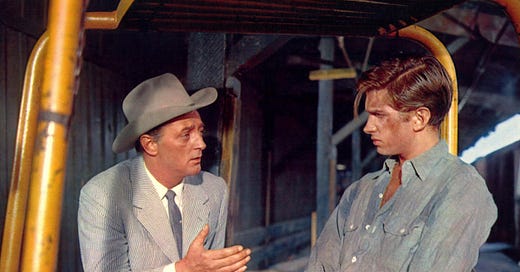Reeling Backward: Home From the Hill (1960)
Matthew Socey says the Vincente Minnelli Southern Gothic is an underappreciated Cinemascope melodramatic gem that leans more towards “Giant” than “Peyton Place.”
Please support Film Yap by signing up for a subscription now!
It must have been the timing. I was pleasantly blind-sided by a big ol' heapin' of family melodrama called “Home From the Hill.” Released in 1960, it still reeks of the big budget epics of the '50s.
Before the review, how I obtained this gem: I occasionally wander the aisles of certain businesses that still sell used DVDs on the cheap. After a while, one starts to recognize fonts on the spine of the DVDs. Between the bold red letters and the Warner Brothers label, I knew I had found an older title that I didn't know. Now I do.
“Home From the Hill” tells the tale of big Texas landowner Wade Hunnicut (Robert Mitchum), a less-flamboyant Big Daddy who owns the majority of the town he lives in. A manly man who hunts when he wants and fools around with any woman in town that he wants. His wife Hannah (Eleanor Parker) knows of his philandering, but says nothing unless provoked. They're married only on paper. Their exchanges are heated, but not loud. They can afford to argue quietly.
Besides Wade's screwing around, they are currently fighting (like a Lone Star Titania and Oberon) over the soul of their changeling, their high school-age son Theron played by an early-in-his-career George Hamilton (More on him later). Wade thinks he's had enough time collecting trinkets and reading books. It's time for Theron to become A Man and do manly things like hunt and ask a girl out on a date, both under the guidance of Wade's favorite workhand Rafe (George Peppard, a year before “Breakfast at Tiffany's”).
This family epic also has that 1950/60s film feel where the scenes shot on location are mixed in with obvious studio scenes. For instance, the opening scene has Wade and his entourage of manly men are duck hunting in an obvious studio. Out of nowhere, a lone gunman (a jealous husband whose wife was shtupped by Wade) tries to shoot Wade, but Rafe sees it coming and pushes Wade out of the way and winds up only getting nicked in the shoulder (and a later shirtless Mitchum scene with a doctor, you're welcome).
Meanwhile we learn of Rafe (who really, really wants to be Hud) and Wade's business arrangement. Rafe lives in a cottage on Wade's land rent-free and tends to himself Rafe tells Wade "Where you go, I go." The truck scene reeks of Big Family Secret. The BFS will come up later, especially between Theron and Rafe and then Theron and Wade.
After shooting a wild boar and receiving his Man Card, Theron is nervous about asking Libby (Luanna Patten, who's film debut was in Song of the South) over to his home for a small family gathering aka giant Texas barbecue. Sitting in Rafe's pick-up truck. Theron persuades Rafe to go ask Libby out for him. Theron has apparently never seen a 1950s family melodrama because he should know this is a really bad idea. Rafe and Libby meet-cute while she's washing her truck (not Cool Hand Luke-style). He's very up front about why he's asking and Theron isn't. Libby tells Rafe she likes a man who does a job himself. Poor Theron does not see this coming.
The film is directed by Vincente Minnelli (the same year he directed “Bells Are Ringing”) and co-written by Harriet Frank, Jr. and Irving Ravetch. This duo would later earn Academy Award nominations for their adaptations of “Hud” and “Norma Rae.” They'd stay in this cinematic portion of the south with films like “Hombre,” “The Reivers,” “The Cowboys,” “Conrack” and “Murphy's Romance.”
What makes “Home From the Hill” work so well is that everyone involved (from director to writers to cast) hit just the right tone. A lesser experienced cast and crew would turn this into southern-fried camp. An exchange with exclamation points doesn't turn into all caps. There are some silly-ass lines, but they work here.
Theron: Libby, I'm dying to kiss you.
Libby: Don't die. (They kiss) Let me show you...
Or this exchange...
Theron: He's your son!
Wade: His mother was a tramp!"
Not to give away too much, but when someone falls ill, the town doctor announces that this character suffers from "a whop of a collapse" while Theron said this person "got sick for hating my father." I love cinematic health conditions. At least they didn't catch a case of The Vapors.
A potential scandal involving Libby, Theron and Rafe take up the final half-hour along with a shooting, a car chase, a big climax and a film score loud enough and important enough that from another room my wife could say "You're watching something from the '50s."
Mitchum is very comfortable as Wade. His screen presence and his deep voice carries half of this performance. Being this wealthy mean never really having to raise your voice. Parker holds her own in her scenes with Mitchum and elevates the young Hamilton. It's amusing to see young George Hamilton before he became the bronzed smarmy pop-culture icon.
“Home From the Hill” is an underappreciated Cinemascope melodramatic gem that leans more towards “Giant” than “Peyton Place,” thank goodness. To quote famed cinematic football coach Tony D'Amato that the margin for error is so small. One-half second to slow, too fast, you don't quite catch it. “Home From the Hill” hits the sweet spot.
Matthew Socey is host of the podcast Film Soceyology for WFYI 90.1 FM and wfyi.org.




